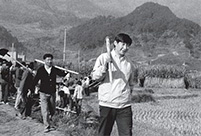 Top 100 beauties in the world!
Top 100 beauties in the world!
 Gallery: Who is the most beautiful one?
Gallery: Who is the most beautiful one?
 If you like autumn, put your hands in the air!
If you like autumn, put your hands in the air!
 Fan Bingbing's "Queen style" in new play
Fan Bingbing's "Queen style" in new play
 Lingerie show at 2014 Miss China
Lingerie show at 2014 Miss China
 J-10 fighters show aerobatic stunts in smog-free sky
J-10 fighters show aerobatic stunts in smog-free sky
 Charming contestants of Shanghai Int’l Model Contest
Charming contestants of Shanghai Int’l Model Contest
 Most amazing chi-pao beauties
Most amazing chi-pao beauties
 7 deadly animal attacks
Russia to launch 70 Proton rockets by 2020: official
7 deadly animal attacks
Russia to launch 70 Proton rockets by 2020: officialBEIJING, Nov. 21 -- "How much blood do you need?" Wang Yong asks on his mobile phone, while handing a bottle of water to his customer.
When his phone rang, the 35-year-old switched roles from a snack vendor in a Beijing park to the leader of an alliance known as "panda blood".
"Panda blood" refers to the Rh-negative blood type in China, which, as the phrase suggests, is "as rare as pandas". Only three out a thousand people in China carry the blood type. If multiplied by the total 1.3 billion population, the number is not so small, almost 4 million people.
It was a news report Wang saw on the rare blood type in 2002 that ultimately led him to his dual roles as snack peddler and heroic middleman for those in need of rare blood.
The report examined a taxi driver who was diagnosed with Leukaemia. When doctors tried to give him blood transfusion, they found his blood type Rh-negative and incompatible with other blood types. In despair, the driver told reporter that he would give up and go back home to wait for his final moment.
Seeing the report, Wang Yong felt deep sadness.
"With such a large population in China, why can't we find another person whose blood may save him?" he asked.
The report prompted him to head online and post under the nickname Xiaolong, calling for people of Rh-negative blood type to form an alliance, so as to help each other.
Now his alliance has about 30,000 members, who have saved the life of more than 3,000 people.
HOPE
It is not easy to tell how many such alliances are there in China, as they were often founded by ordinary people like Wang. But their existence means hope.
On September 28, Shanghai witnessed a "blood relay". The patient was a Spanish businessman Ramon, who was only identified by his first name, because his family didn't want the full name reported.
The man was a terminal patient of esophagus cancer and his blood type was A with Rh-negative.
His friend, a Ms. Xiao told Xinhua that they pinned hope on a blood transfusion which could prolong his life, so that Ramon would at least be able to see his sister before he died. They posted their request online.
A girl nicknamed Taro saw the request. "I was touched by the man's story," she said. "Ramon has lived in China for 18 years. After the Wenchuan earthquake in 2008, he donated 150,000 yuan (about 24,497 U.S. dollars). In comparison, what I could do was really no big deal."
After the donation, Ramon's family offered her money to express their gratitude, which was rejected by Taro. "I just wanted to help," she said.
NOT ALWAYS SUCCESSFUL
The Shanghai Rare Blood Alliance was established in 2007 by a former salesman Xie Yingfeng who came from China's Xinjiang Uygur Autonomous Region.
The 35-year-old Xie found out he was an Rh-negative blood type during premarital check-up. "I suddenly feel a sense of loneliness and wanted to find people with the same kind as me after hearing the news," he said.
Now more than 300 volunteers, including Taro, have joined Xie's rare blood alliance. With a sense of mission, the alliance saved more than 30 patients in Shanghai last year.
But not every rescue is a success. One day in 2012, Xie received a call from a young mother choking with sobs. Her six-year-old child with Rh-negative blood type was critically ill and in dire need of the rare blood. But the hospital did not have enough in storage.
Xie immediately contacted volunteers nearby, but when they arrived, the child had already passed away.
"The child is at the same age of my son," Xie said bitterly, "the failed rescue is a heavy blow to me."
CHILL AND PAIN
While many donors act courageously by offering their blood, the rarity has also lured blood peddlers looking to cash in on other's dire medical needs.
"I heard that 'Panda blood' is very expensive. On the black market, patients pay somewhere between 10,000 yuan and 20,000 yuan (1,633 to 3,266 U.S. dollars) for 100 milliliter of such blood," Xie said.
In order for more patients to recieve their life-saving blood and protect well-intentioned volunteers, Xie usually contacts the family of patients to ask for the patient's name, age and where he or she is hospitalized. He then checks with the hospital to see if the situation is true before providing help.
But this does not prevent them from being misunderstood.
Once a volunteer from Wang Yong's alliance flew to Sichuan to provide blood for a pregnant woman, the donation center refused to take his blood, accusing the volunteer of being an illegal blood dealer.
The soft-spoken Wang suddenly flew into a rage. "You take his blood first, and then call the police," he shouted to the telephone. "I am waiting here."
DREAMS
There are also misunderstandings of "Panda blood". There's a story circulating online of a girl, after discovering she had Rh-negative blood, who had her boyfriend break up with her because his family doubted if she could give birth to a healthy baby.
Even some doctors are unsure about what "Panda blood" is. Some hospitals reject pregnant Rh-negative women from delivering unless they prepare enough such blood by themselves.
The volunteers shared a dream that blood centers would no longer lack blood supply if information about individual's blood type could be stored on an identity card.
"In this way, nearly 4 million people will know they are Rh-negative blood type, and stand out to help each other when needed," Xie said, "God makes us different, and we must shoulder the responsibility to be different."
"If one day," said Wang Yong, "all the patients, with rare blood types or not, could all get blood easily as long as they need, our alliances will be dismissed."
 Female soldiers
Female soldiers Hot girls at motor show
Hot girls at motor show  Official trailer of Y-20
Official trailer of Y-20 Photos: Xi Jinping in Fujian
Photos: Xi Jinping in Fujian Standard faces for each countries
Standard faces for each countries China-made military transport aircraft gets ready
China-made military transport aircraft gets ready World Pole Dance Championship in China
World Pole Dance Championship in China Shocking! Photos of Chinese fighters revealed
Shocking! Photos of Chinese fighters revealed 59-year-old Liu Xiaoqing still looks stunning
59-year-old Liu Xiaoqing still looks stunning  Top 10 most dangerous jobs in the world
Top 10 most dangerous jobs in the world  Top 10 fifth generation jet fighters in the world
Top 10 fifth generation jet fighters in the world Top 10 Chinese goddesses
Top 10 Chinese goddesses  Top 20 hottest women in the world in 2014
Top 20 hottest women in the world in 2014 Top 10 pure beauties in showbiz
Top 10 pure beauties in showbiz  Top 10 world's highest-paid models 2014
Top 10 world's highest-paid models 2014 The most gorgeous Chinese women
The most gorgeous Chinese women Top 10 most handsome faces in Asia
Top 10 most handsome faces in AsiaDay|Week|Month